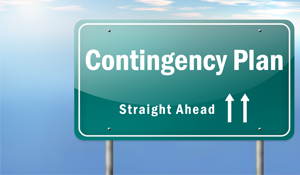Who Will Run Your Business If You Can’t?
“…operating without a succession plan is like skydiving without a will. You can do it, but there’s some peril for those you might leave behind.” ~ Steve McKee
If you’re not sure if your business can run without you, it’s time to take a serious look at your plans for the future of your business. In two of our most recent articles, we discussed contingency planning – Protect Your Wealth with Contingency Planning and What Will Happen to Your Business If You're Not There? We covered the nuts and bolts of what your Contingency Plan should include. Now let’s take a look at WHO might be able to carry out your plans and run the business if you can’t: succession planning.
Succession planning involves replacing yourself in the business using a well-thought-out plan, so that the business can successfully operate without interruption. And it should be a key part of your contingency planning.
Why You Need a Succession Plan
In a SmartBrief article “Day one” of succession planning, Steve McKee argues that succession should begin on day one for business owners, which he concedes may sound strange since at that time you’re more focused on survival and keeping the lights on than finding someone else to run the business, cashing out, or your legacy.
However, he says: “Too many entrepreneurs neglect succession planning, thinking they’ll one day simply sell the company to an outside concern and walk away. Other founders blissfully keep their heads in the sand as if they can run things forever. But an external buyer isn’t going to be interested in acquiring a house that’s not in order – at least not at anything more than a fire-sale price – and it’s unreasonable to expect your internal team to step up before the company is ready to thrive without you.”
In a recent survey, business brokers and advisors were asked to rank the top due diligence items that buyers care about most right now, and businesses with strong management teams and employees were at the top of the list:
- For business sales that closed for less than $2M, buyers were concerned about employees – specifically longevity, loyalty, and work ethic. Buyers’ other concerns included operations, revenue, customer concentration, and management team/key employees.
- For deals in the $2 to $50M price range, financials barely edged out revenue and management team/key employees for the top spot. The next three were equally important to buyers: employees, customer concentration, and operations.
Buyers want key employees to stay with the business and losing them can kill a deal or decrease the value of your business.
And of course, you want to make sure that your family and employees are taken care of, and that your business can continue operating in the event that something happens to you.
Starting Your Succession Planning
Your succession plan should:
- Create a situation where you are not needed for your business to successfully operate without interruption.
- Develop a capable, empowered, engaged management team and a sufficiently groomed and mentored owner replacement, responsible for the overall operation of the business without your direction or input.
- Provide ample time, effort, and tools to develop your replacement and your team. We describe this more here: Understanding the Critical Components of a Succession Plan.
Succession must be an integral part of your overall contingency planning process. Make sure that your business and heirs are protected if you can no longer run your business.
P.S. We also invite you to learn more about all of the business owner resources available to you at no cost at Business Transition Academy. Download a full PDF version of our book Cashing Out of Your Business – Your Last Great Deal ($17.95 value) for FREE and learn how to exit your business on your own terms and for the best price.




